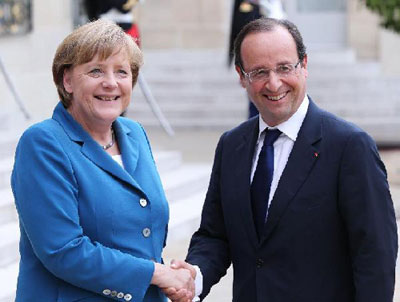
|
| French President Francois Hollande (R) welcomes visiting German Chancellor Angela Merkel at the Elysee presidential palace in Paris, France, June 27, 2012, on the eve of the EU Summit in Brussels. Hollande and Merkel met here on Wednesday evening in a new attempt to bridge rift and hammer out concrete tools to solve the debt crisis as Europe is on edge. (Xinhua/Gao Jing) |
In their respective speech, Hollande and Merkel focused on the progress made to implement growth-boosting measures while avoided to note the controversial budgetary discipline.
"We have worked well. There has been a particular progress on growth ... We want to intensify the economic and monetary union, and tomorrow, the political union to achieve integration and solidarity," the French president said.
Meanwhile citing the significant effort to outline a growth pact, Merkel stressed the obligation to build "a strong and stable Europe."
"We need a Europe that works and that's what markets expect and Europe whose members help each other," she said after her arrival to the Elysee Palace.
Renewed rift between Europe's two powerhouses appeared ahead Paris meeting after Merkel said shared eurobonds, a proposal backed by Europe's top three members, would not happen in her life.
Addressing the Bundestag, or the lower house of parliament on Wednesday, Merkel considered the move to pooling of eurozone debt illegal and impossible under Germany's constitution, but also economically "wrong and counterproductive."
Denouncing German-inspired austerity focus on tackling deficits and public debt, Hollande called for greater emphasis on growth and to issue mutualized debt to accompany the fiscal pact.
Over dinner, Hollande and Merkel will try to smooth over ideological differences with the aim to come out with a common compromise to end two years of financial downturn ahead the two-day EU meeting that will open Thursday and set to decide the future of the single-currency bloc.
In a sign of a possible end of the gloom in sight, Berlin backed growth package in Europe and agreed on a 130-billion-euro (162 billion U.S. dollars) pact to revive growth after Europe's four key leaders' meeting in Italy last week.
Merkel also accepted measures to increase capital for the European Investment Bank, reallocation of EU regional aid funds, project bonds to fund infrastructure, and the transaction tax, pushed by Hollande.
"Despite the prominence of their divergence, they made a progress and they are still going forward. There have been many discussions to reconcile their points of view," Jean-Louis Mourier, analyst at Aurel BGC, told Xinhua.
"Merkel's speech to parliament is little disturbing but I don't think she will use the same speech with her European partners," he added.
VietNamNet/Xinhuanet